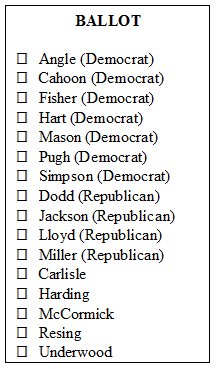
|
Craig Steiner, u.s. Common Sense American Conservatism |




|
|
About Me & This Website My Positions On Facebook Contact Me Articles |
If you lived in a county where Republicans are 50% of the electorate--but if the election official just happened to be a Democrat--how would you feel about a "non-partisan" election ballot that looked like this:  It'd be a little suspicious, wouldn't it? Heck, that kind of ordering would be suspicious even in a Democrat county. Republicans would surely protest if the Democrat election official then stated that the order was determined by a committee (that he had appointed) that adopted rules that said that Democrats would be listed first because it just so happened that, nationally, Democrats were ahead in the polls. It would be even more objectionable if the reason given for such a grouping was "To make it easier for those that want to vote Democrat to vote Democrat, and those that want to vote Republican to vote Republican..." As if their party affiliation in parenthesis right after their name wouldn't make it easy enough for the Democrats and Republicans to figure it out in an alphabetical list. It's a proposition that is absurd on its face. Yet this is the reality in which Colorado Republicans are poised to find ourselves at the 2012 Colorado Republican Assembly.  Those individuals that are pledged to a presidential candidate will be grouped with others pledged to the same presidential candidate on one side of the ballot while the unpledged delegates will be listed on the other side. Those individuals that are pledged to a presidential candidate will be grouped with others pledged to the same presidential candidate on one side of the ballot while the unpledged delegates will be listed on the other side.The reason given for grouping delegates by presidential pledge is that it would be an "undue burden to force the 3800 delegate to hunt and peck through a mass list to find the delegates pledged to vote for a particular presidential candidate to vote for." Again, it would seem that having the name of the presidential candidates in parenthesis after the name of each delegate would make those delegates pretty easy to find. It's also been stated that this is a logistical necessity based on the fact that 800 individuals will be listed on the ballot. I can appreciate the challenges of such a large ballot, but I don't see how a few extra characters to indicate presidential pledge (MR=Mitt Romney, RS=Rick Santorum, RP=Ron Paul, NG=Newt Gingrich) after each name would somehow make it impossible to fit on the ballot. Just use a slightly smaller font, if necessary. And even if it's true that a wieldly multi-page ballot would be necessary, the extra work involved would be worth it to achieve an unbiased process free of suspicion. Unfortunately, this isn't the first the RNC delegate ballot has been the subject of skepticism this year. The North Dakota GOP State Assembly last week also suffered from a defective, non-alphabetical delegate ballot  that undermined the integrity of their entire election process. Not only does it undermine the process of each state assembly, it ultimately undermines confidence in the eventual nominee since there are questions about the manner in which he became the nominee. that undermined the integrity of their entire election process. Not only does it undermine the process of each state assembly, it ultimately undermines confidence in the eventual nominee since there are questions about the manner in which he became the nominee.The practical reality is that the only way to fairly construct this kind of ballot so as to neither help nor hurt any given presidential candidate or delegate is to order names alphabetically. Any other arbitrary ordering will necessarily influence the outcome of the vote. Having organized two county assemblies where our county has decided three contested races for public office, and having organized three central committee meetings where our county party has resolved a total of six races to elect party officers, I've always produced ballots by listing the names of candidates in alphabetical order. No-one has ever questioned the alphabetical nature of the ballots. The order was obvious and understood to be unbiased. And it's the way the state party has ordered its delegate ballots in the past. The ballot, as proposed, will favor the presidential candidate whose delegates are listed before others on the ballot. It will also favor each of the delegates who are listed first within a presidential candidate's group of pledged delegates. And it puts unpledged delegates at an even further disadvantage than they already are since many voting members will vote without even turning over the ballot and looking at the list of unpledged delegates that are also running. Top-line ranking is something candidates fight for. Democrats and Republicans flip for whose candidates will appear on the top-line in the general election. It's a big deal. An alphabetical list will neither help nor hurt any presidential candidate, it won't help or hurt any individual delegate, and is not an undue burden on assembly delegates that want to only vote for supporters of their preferred candidate. Regardless of the intent, any ballot of candidates for RNC delegate that is not ordered alphabetically will unduly influence the outcome of the vote and should be summarily rejected. Go to the article list |